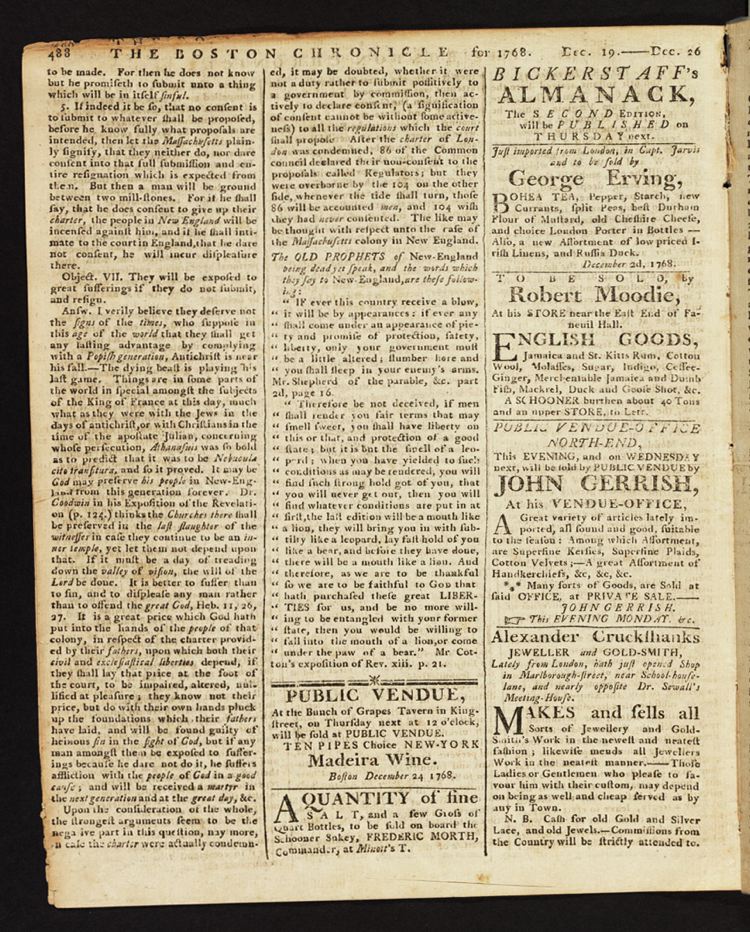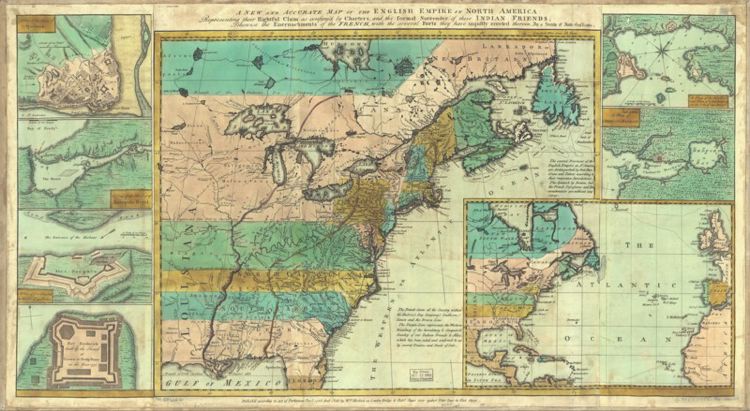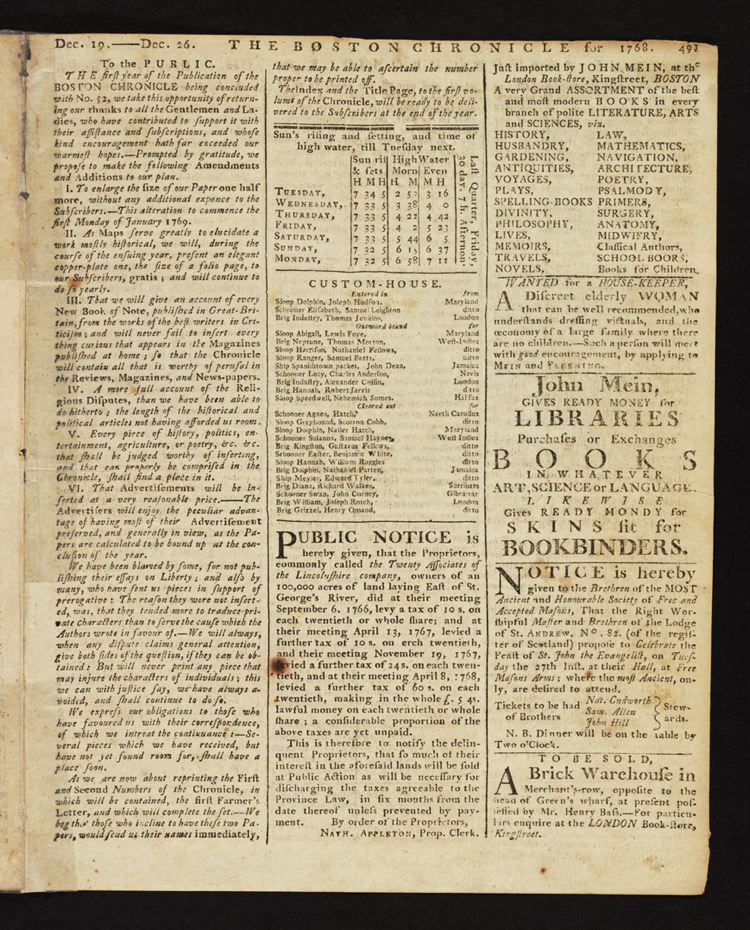Lesson Plan Four: Work
Creating a Colonial Identity
In this activity students will evaluate primary source documents from early America to create a fictional colonist. Students may choose to be a laborer in an American city, a farmer or a slave.
Create a Colonial Identity: Instructions
- Break into groups.
Each group should have four students.
-
Research American Colonial Life.
Assign each student in your group one area of research. Each student will examine one or more documents and complete an analysis sheet to decipher clues about working during colonial times. Once you have read your documents, complete the appropriate Document Analysis Worksheet located on each document page. As you read your documents consider the following essential question:What does this document say about working in colonial America?
-
Report to your group
Armed with your Document Analysis Worksheet and your answer to the essential question above, report back to your group about your insights into working life in Colonial America.
- Choosing a job for your Colonist
Now that you have insight into colonial work, choose the type of job you would like to explore in more detail as you complete this webquest. Will your colonist be a farmer, a city laborer or a slave?
- Create your Colonial Identity
You are ready to create your colonial identity! Click on links below to create a fictional colonist in the job that you have chosen.
Farmer Questionaire
| Name your American Colonist: | |
| What is the sex of your colonist? | Male Female |
| How old is he (or she) ? | |
| Is she (or he) married? | Yes No |
| How many children does he (or she) have? | |
| What kind of farmer is he (or she)? | |
| In what colony (state) does your colonist farm? | |
| How common was this type of farming in Colonial America? | Very common Somewhat common Rare |
| What evidence do you have to support this? | |
| What evidence do you have to support this? | |
| Does this farmer own slaves? | Yes No |
| Do you think this was a difficult life? Why or why not? | |
| What evidence do you have to support your opinion? | |
| What impact do you think the American Revolution had on this type of farmer? |
Slave Questionaire
| Name your American Colonist: | |
| What is the sex of your colonist? | Male Female |
| How old is he (or she) ? | |
| Is she (or he) married? | Yes No |
| How many children does he (or she) have? | |
| Does your slave work in a city or a plantation? | |
| What type of work does your slave do? | |
| In what colony (state) does your slave work? | |
| How common was this type of farming in Colonial America? | Very common Somewhat common Rare |
| What evidence do you have to support this? | |
| Do you think this was a difficult life? Why or why not? | |
| What evidence do you have to support your opinion? | |
| What impact do you think the American Revolution had on your slave? |
City Laborer
| Name your American Colonist: | |
| What is the sex of your colonist? | Male Female |
| How old is he (or she) ? | |
| Is she (or he) married? | Yes No |
| How many children does he (or she) have? | |
| What industry does your colonist work in? | |
| In what city does he (she) work? | |
| Was your colonist born in the United States? | Yes No |
| If not, where was she (he) born? | |
| How common was this type of farming in Colonial America? | Very common Somewhat common Rare |
| What evidence do you have to support this? (which documents?) | |
| Is your colonist wealthy? | Yes No |
| Do you think this was a difficult life? Why or why not? | |
| What evidence do you have to support your opinion? | |
| What impact do you think the American Revolution had on this type of city laborer? |
Newspaper Analysis
Have students read the following excerpts from the Boston Chronicle, December 26, 1768.
"Public Notice"
"Public Vendue"
 -->
-->

This resource is in the Maass archive
What clues does the Public Venue section of this Newspaper give you about working in Colonial America?
Hand out the Written Document Analysis Form and have students complete it.
http://www.archives.gov/education/lessons/worksheets/written_document_analysis_worksheet.pdf
You may also chose to browse the entire newspaper, which can be found by following the link below.
Boston Chronicle, December 26, 1768
Map Analysis
Download, print, and hand out the Map Analysis Form for use with the activity below.
http://www.archives.gov/education/lessons/worksheets/map_analysis_worksheet.pdf
Map Analysis
Examine the Map below
 -->
-->

A new and accurate map of the English empire in North America; Representing their rightful claim as confirmed by charters and the formal surrender of their Indian friends; likewise the encroachments of the French, with the several forts they have unjustly erected therein. Society of Anti-Gallicans. Sold by Wm. Herbert & Robt. Sayer, London, 1755
map retrieved from The Library of Congress, American Memory maps collection:
http://memory.loc.gov/cgi-bin/query/r?ammem/gmd:@field(NUMBER+@band(g3300+ar006200))
What clues does this map give you about work in Colonial America?
You may also chose to view other colonial and Revolution Era maps
Click on the link below to explore the Library of Congress map collection:
Library of Congess Revolution Era Map Collection
Slavery in Colonial America and Slave Law Analysis
Click on the link below do read an introdution on slavery in Colonial America available from the Colonial Williamsburg website.
Slavery in Colonial America
http://www.history.org/Almanack/people/african/aaintro.cfm
Hand out this Written Document Analysis Form.
http://www.archives.gov/education/lessons/worksheets/written_document_analysis_worksheet.pdf
Colonial Slave Laws
What clues do these laws and the introduction you read about slavery in Colonial America give you about work in Colonial America?
Virginia, 1639
Act X. All persons except Negroes are to be provided with arms and ammunitions or be fined at the pleasure of the governor and council.
Maryland, 1664
That whatsoever free-born [English] woman shall intermarry with any slave. . . shall serve the master of such slave during the life of her husband; and that all the issue of such free-born women, so married shall be slaves as their fathers were.
Virginia, 1667
Act III. Whereas some doubts have arisen whether children that are slaves by birth. . . should by virtue of their baptism be made free, it is enacted that baptism does not alter the condition to the person as to his bondage or freedom; masters freed from this doubt may more carefully propagate Christianity by permitting slaves to be admitted to that sacrament.
Virginia, 1682
Act I. It is enacted that all servants. . . which [sic] shall be imported into this country either by sea or by land, whether Negroes, Moors [Muslim North Africans], mulattoes or Indians who and whose parentage and native countries are not Christian at the time of their first purchase by some Christian. . . and all Indians, which shall be sold by our neighborign Indians, or any other trafficing with us for slaves, are hereby adjudged, deemed and taken to be slaves to all intents and purposes any law, usage, or custom to the contrary notwithstanding.
Slave Laws retrieved from Pbs.com at: http://www.pbs.org/wgbh/aia/part1/1h315t.html
Diary of a Colonial Housewife / Diary Analysis
Have students read the following excerpts from Mary Cooper's Diary.
Hand out the Written Document Analysis Form.
http://www.archives.gov/education/lessons/worksheets/written_document_analysis_worksheet.pdf
You may also chose to explore Mary Cooper's Long Island life in greater detail at the following link:
Colonial Life in Long Island
http://www.newsday.com/community/guide/lihistory/ny-history-chap3cov,0,109761.storygallery?coll=ny-lihistory-navigation
Mary Cooper's Diary
What clues does Mary Cooper's Diary give you about working in Colonial America?
Excerpts from the Diary of Mary Cooper a Colonial Housewife living on Long Island
July the I, I769, Saterday. A fine clear day. Very hot. I have been unwell all the weeke, dirty and tired all most to death.
July the 2, Sabbath. I went a foot to town. Got to the afternoon meeten extreemely tired and hot.
Noonday. I am much freted with Ester prepareing the house for some yong women, Doctor Laourence daughters and Salle Wright and some others.
Tuesday. Extreeme hot and dry. Bet and Deb L., Ester and Deb T., Ab and Nep Y. here and stay all night. My Salle Wright here to stay some time.
Wednsday. Extreeme hot and dry. The girls gon home, all but Salle Wright.
Thirsday. Melting hot and dry. O, I am tired almost to death. Up late makeing wine.
Friday. Hot as yesterday. I am dirty and distressed, almost weared to death. Dear Lord, deliver mee.
Saterday. Extreemely hot and dry. If the Lord dose not look in mercy upon the earth and send some rain we shall perish. Isreal and Nick came here.
July the 9, Sabbath day. Somthing cloudy. I and Ester walk to the New Light meeten parte of the way in the rain. A fine rain all the after noon. I felt very dul and unsensabel all the day and I belive all the rest was much so.
Moonday. Cloudy but no rain. Clears in the afternoon.
Tuesday. Clear and very hot. O, I am very unwell, tiered almost to death cooking for so many peopel.
Wednsday. Fine clear weather. Much freting a bout dinner.
July the 13, 1769, Thirsday. This day is forty years sinc I left my Father's house and come here, and here have I seene littel els but harde labour and sorrow, crosses of every kind. I think in every repect the state of my affairs is more then forty times worse then when I came here first, except that I am nearer the desierered haven. A fine clear cool day. I am un well.
Friday. Cloudy and like for rain. Rain most of the night.
Saterday. Clear and very hot. Evening, a very greate rain and thunder this night.
July the 16, Sabbath. A fine, clear and extreemely hot day. L. Wheler has fits. S. Cooper is makeing some proposels to live with Ester. I did not go to meeten last night nor to day.
Moonday. A fine clear and still morning, like to be very hot. Thunder and rain most of the after noon.
Tuesday. A north east wind and rain all the forenoon. Mis Sillick and her husband [ ] here. They are gon to Hunton Town.
Wednsday. A fine clear and still morning. Mis Sillick and her husband here. They are gon home. Ptr, Linde, Isreal here to get cheres. Frances has a strange ide this night that something is the matter with her son Barsilla.
Thirsday. A fine clear morning. We began to dry cheares. 14 young peopel from Cold Spring came here to get cheres. Evening, grows cloudy and like for rain.
Friday. Showery all day. Freelove Smith, her son, and some Dutch men come here to get cheres. Ester is gon to Huntan Town with Ms. Smith to se after the two Salle Wrights that has been thare all the weeke.
Saterday. A fine clear and very hot day.
July the 23, 1769, Sabbath. A fine clear still morning. Very tired with harde worke. I did not go to meeten.
Moonday. I am drying cheres. Afternoon, exceeding high wind and a very greate shower of rain. I am much distrest with hard worke.
Mary Cooper's Diary , retrieved from Newsday's Long Island: Our Story, Colonial Long Island http://www.newsday.com/community/guide/lihistory/ny-history-hs331a1v,0,656897.story?coll=ny-lihistory-navigation
« Return to Index

